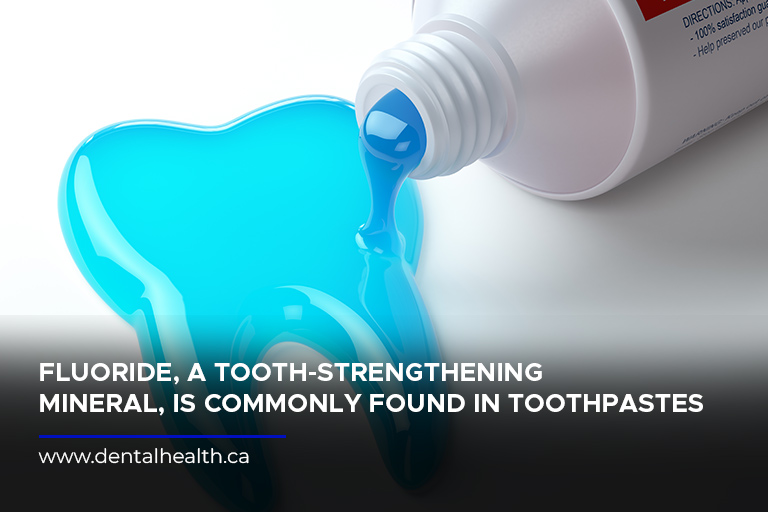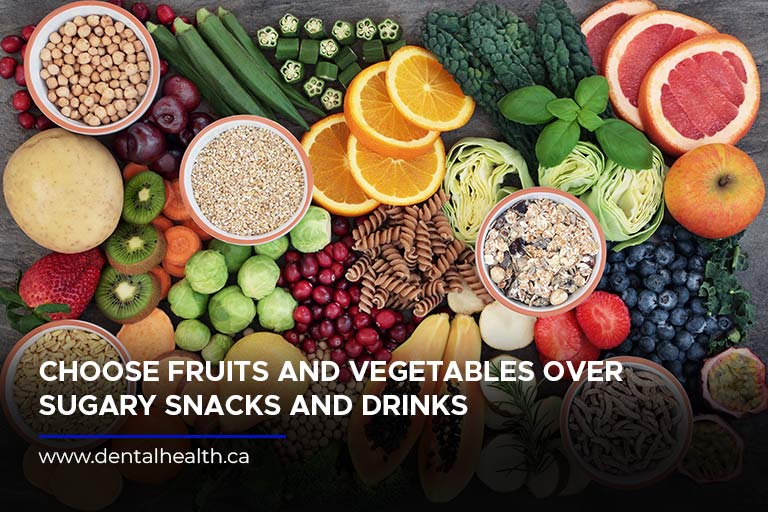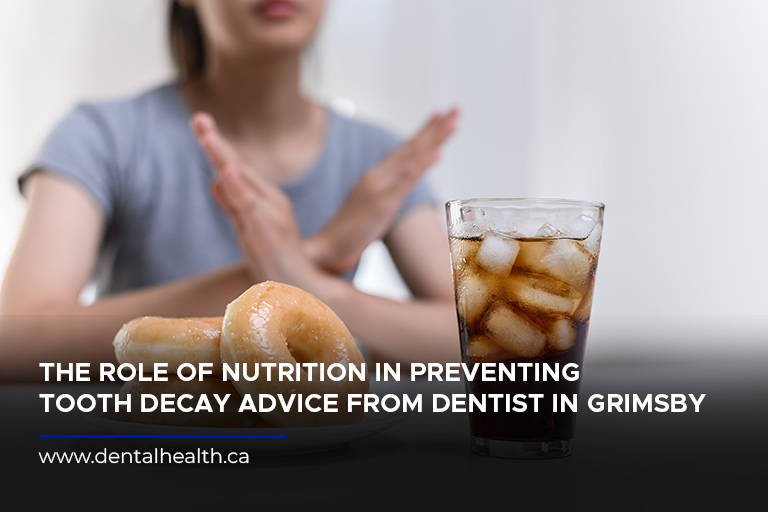Maintaining a healthy diet is essential for overall well-being, but many people overlook its impact on oral health. The foods we consume play a significant role in the health of our teeth and gums. By choosing nutrient-rich foods and avoiding those that promote tooth decay, we can maintain a bright and healthy smile.
Preventing tooth decay is crucial for various reasons. It leads to fewer cavities, less pain, and lower dental costs. Regular dental visits combined with proper nutrition can significantly reduce the risk of developing dental problems. Taking preventive measures ensures better oral health and contributes to overall health and well-being.
Common Causes of Tooth Decay
Tooth decay is a prevalent issue caused by various factors. Understanding these causes can help in preventing and managing dental problems.
- Sugary Foods and Beverages: Frequent consumption of sugary foods and drinks fuels the growth of harmful bacteria in the mouth. These bacteria metabolize sugars, producing acids that attack tooth enamel, leading to cavities and decay. Limiting sugary intake and practicing good oral hygiene are essential for prevention.
- Poor Oral Hygiene: Neglecting regular brushing and flossing allows plaque, a sticky film containing bacteria, to accumulate on teeth. The bacteria in plaque produce acids that erode enamel, causing cavities. Maintaining proper oral hygiene habits is crucial for removing plaque and preventing decay.
- Acidic Foods and Drinks: Regularly consuming highly acidic foods and drinks, such as citrus fruits, sodas, and sports drinks, can gradually wear down tooth enamel. This erosion weakens the protective layer of teeth, making them more vulnerable to decay. Moderation and rinsing with water after consumption can help minimize the impact.
- Frequent Snacking: Continuous snacking throughout the day provides a constant source of fuel for oral bacteria. This leads to prolonged acid production and increased risk of tooth decay. Limiting snacking frequency and choosing healthier options can help reduce the risk.
- Dry Mouth (Xerostomia): Saliva plays a crucial role in neutralizing acids and washing away food particles, protecting teeth from decay. Dry mouth, often caused by medications or certain medical conditions, reduces saliva flow, increasing the risk of cavities. Addressing the underlying cause and using saliva substitutes can help manage dry mouth.
- Genetics: Genetic factors can influence tooth enamel strength and susceptibility to decay. Some individuals may inherit weaker enamel or other dental traits that make them more prone to cavities. While genetics cannot be changed, maintaining good oral hygiene and seeking professional care can mitigate the risks.
- Not Visiting the Dentist Regularly: Regular dental check-ups are essential for preventive care and early detection of dental problems. Skipping visits means missing out on professional cleanings, fluoride treatments, and early identification of cavities or other issues, potentially leading to more extensive and costly treatments in the future.
The Power of Protective Nutrients

Certain nutrients are particularly beneficial for maintaining strong and healthy teeth. Including these in your diet can help protect against tooth decay.
- Calcium: The cornerstone of strong teeth and bones, calcium is abundant in dairy, leafy greens, and fortified foods. It fortifies enamel, the protective outer layer of teeth, promoting overall oral health.
- Vitamin D: A crucial partner for calcium, vitamin D aids its absorption. Found in sunlight, fatty fish, and fortified foods, it ensures calcium is effectively utilized to strengthen teeth and bones.
- Phosphorus: Working in tandem with calcium, phosphorus builds strong teeth and bones. This mineral, prevalent in meat, dairy, nuts, and beans, aids in the repair and regeneration of tooth enamel.
- Vitamin C: A champion for gum health, vitamin C stimulates collagen production, essential for maintaining gum tissue. Citrus fruits, strawberries, and bell peppers are rich sources of this vitamin.
- Vitamin A: Saliva’s best friend, vitamin A promotes its production, helping to wash away food particles and bacteria, thus safeguarding teeth. Carrots, sweet potatoes, and leafy greens are excellent sources.
- Fluoride: A powerful mineral for teeth, fluoride strengthens enamel, making it resistant to decay. It is present in drinking water, toothpaste, and some foods.
- Antioxidants: Guardians against damage, antioxidants, found in fruits, vegetables, and nuts, protect gums and oral tissues from harmful bacteria and free radicals.
- Probiotics: Tiny heroes for oral health, probiotics, found in yogurt and fermented foods, maintain a healthy balance of bacteria in the mouth, reducing the risk of decay.
Grimsby Dentist’s Diet Recommendations

Dentists in Grimsby emphasize the importance of a balanced diet for maintaining oral health. Here are some dietary recommendations to help prevent tooth decay.
- Limit Sugary Foods and Drinks: Minimize sugary snacks and beverages like candy, soda, and juice. These can feed harmful bacteria in your mouth, leading to tooth decay and cavities. Choose fruits, vegetables, and water as healthier alternatives to satisfy your sweet tooth and quench your thirst.
- Stay Hydrated: Drinking plenty of water throughout the day helps wash away food particles and debris that can contribute to tooth decay. It also stimulates saliva production, which helps neutralize acids and protect your teeth. Aim for at least eight glasses of water daily to keep your mouth healthy and hydrated.
- Choose Whole Grains: Opt for whole grains like brown rice, quinoa, and whole-wheat bread instead of refined grains. Whole grains contain more fibre and nutrients, which are beneficial for overall health and can help prevent tooth decay. They also have a lower glycaemic index, meaning they won’t spike your blood sugar levels as quickly.
- Include Dairy Products: Incorporate milk, cheese, and yogurt into your diet for stronger teeth and bones. These dairy products are rich in calcium and phosphorus, essential minerals for maintaining strong tooth enamel and preventing bone loss. Choose low-fat or fat-free options to keep your calorie intake in check.
- Eat Crunchy Fruits and Vegetables: Enjoy crunchy fruits and vegetables like apples, carrots, and celery as part of your daily diet. Their fibrous texture helps scrub away plaque and food particles from your teeth, acting as a natural toothbrush. They also stimulate saliva production, which helps wash away bacteria and protect your teeth.
- Avoid Sticky and Chewy Foods: Limit your consumption of sticky candies, dried fruits, and chewy snacks. These foods can easily get stuck in the crevices of your teeth, providing a breeding ground for bacteria that can cause tooth decay. Instead, choose fresh fruits and vegetables as healthier alternatives.
- Snack Wisely: When you feel hungry between meals, choose nutritious snacks like nuts, seeds, and cheese. These snacks are not only satisfying but also provide essential nutrients for your overall health and dental well-being. Avoid sugary treats and processed foods that can harm your teeth.
A healthy diet is fundamental to preventing tooth decay and maintaining overall oral health. By understanding the relationship between nutrition and dental health, you can make informed choices that benefit your teeth and gums. Incorporating protective nutrients and following dietary recommendations from your dentist will help keep your smile bright and healthy.
For more information on maintaining your oral health and to schedule a dental check-up, contact Kingsway Family Dentistry at (905) 563-4001.

